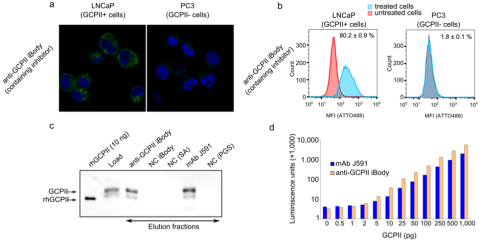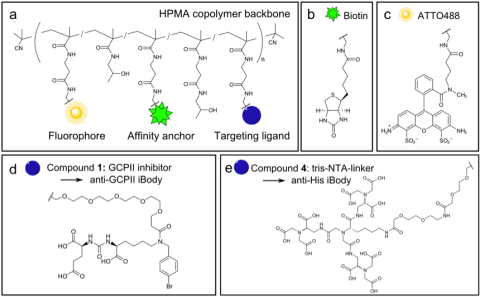iBodies – Modular Synthetic Antibodies
INTRODUCTION:
The use of antibodies allows detection and specific binding of biologically important molecules. Despite considerable success, the use of antibodies has also disadvantages: the production is expensive and needs eukaryotic expression systems because of posttranslational modifications. Therefore, we prepared polymeric antibody mimetics (iBodies).
TECHNOLOGY (INVENTION) DESCRIPTION:
We prepared synthetic polymer conjugates (called iBodies) capable of replacing antibodies in biomedical applications such as ELISA, flow cytometry, immunocytochemistry, Western Blot and immunoprecipitation. These iBodies consist of an HPMA copolymer decorated with low-molecular-weight compounds that function as targeting ligand, affinity anchor and/or imaging probe. We prepared specific conjugates targeting several proteins with known ligands (GCPII, HIV-1 protease, CA-IX, FAP, neuraminidase, and His-tagged proteins) and used these iBodies for enzyme inhibition, protein isolation, immobilization, quantification and live cell imaging as well as for classical Western Blot application. The system is remarkably modular and can be used for different biological/biochemistry assays.
ADVANTAGES OVER EXISTING SOLUTIONS:
System of iBodies is very flexible, modular. In theory, any compound, functional group or tag can be adjusted to user need. iBodies are All-rounder; one ibody can be used for different biochemistry approaches (WB, IP, ELISA, live cell imaging). This polymer platform can be used to produce inexpensive, stable and non-animal-based antibody substitutes directed virtually toward any protein of interest with a known ligand. Additionally, the system binds close protein homologs, such as paralogs and orthologs. It enables to target native mouse proteins, which is virtually impossible with antibodies.
DEVELOPMENT STATUS (STAGE):
Ready to use: anti-His, anti-GST, anti-GCPII, and anti-FAP iBodies (WB, IP, immunostainings on live cells, ELISA)
PUBLICATIONS:
Šácha P, Knedlík T et al. Angew Chem Int Ed Engl. 2016 Jan 8. DOI: 10.1002/anie.201508642
IP PROTECTION STATUS:
PV 2015-19, PV 2015-20, PCT: CZ201605002, CZ201605003
TECHNOLOGY / IP OWNERS :
Institute of Organic Chemistry and Biochemistry AS CR, v.v.i., Prague Institute of Macromolecular Chemistry AS CR, v. v. i., Prague Charles University, Prague


More information
More information is available upon signing a CDA / NDA (Confidential Disclosure Agreement / Non-Disclosure Agreement)